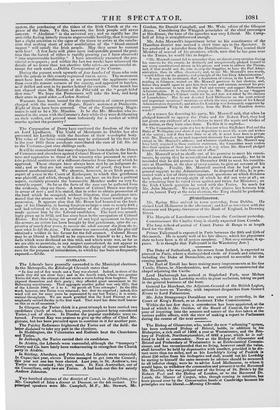Two hundred electors of the district of Cowed, in Argyllshire,
gave My. Campbell of Islay a dinner at Dunoon, on the 4th instant. The .pnncipal speakers were Mr. Campbell, M.P., Mr. Stewart, Mr. Gordon, Sir Donald Campbell, and Mr. Weir, editor of the Glasgow Argus. Considering the Whiggish principles of the chief personages at this dinner, the tone of the speeches was very Liberal. Mr. Camp- bell of Islay is straightforward enough.
Mr. John Maxwell's impertinent letter to his constituents of the Hamilton district was noticed a short time ago in the Spectator. It has produced a rejoinder from the Hamiltonians. They remind their Member of several of his promises, which, now that he has gone over to the Tories, he would like to forget- " Mr. Maxwell cannot fail to remember that, on almost every occasion during his canvass for the county, he distinctly and unequivocally pledged himself to use every constitutional means in his power, and even to address the Throne, and, if that would not do, vote to stop the Supplies, to have the Peel Admi- nistration, then in office, dismissed ; and, to use Mr. Maxwell's own words, would follow out the practice and principle of the late Grey Administration.' "It may also be mentioned, that a deputation of voters, in the Lower Ward, residing in Glasgow, waited on Mr. Maxwell previous to last election, and, before they would agree to give him their votes and interest, received his pro- mise to endeavour to turn out the Peel and restote and support Melbourne's Administration. It is, therefore, strange in Mr. Maxwell to say Support to Lord Melbourne's Cabinet could not be, and was not asked by the electors of Lanarkshire.' Has be not deserted Lord Melbourne on the most critical and important occasions? occasions on which the very existence of his Liberal Administration depended ; and when his Lordship was fortunately supported by every consistent Whig in the count' y, from the Duke of Hamilton down- wards?"
As a reason for deserting his party, Mr. Maxwell said, that when he pledged himself to oppose the Duke and Sir Robert Peel, they bad not given any evidence of a resolution to meet the wants and wishes of the nation, as they have since done. To this it is replied- " The Committee are quite at a loss to discover when Sirillobert Peel and the Duke of Wellington ever showed any disposition to meet the wants and wishes of the nation ; and if they have done so at all, it flutist have been in private with Mr. Maxwell, as no such important discovery has ever been made public, except in Mr. Maxwell's address; and whatever confidence Mr. Maxwell may have lately acquired in these eminent statesmen, the Committee must confess that their opinion of them just temains as it was when Mr. Maxwell pledged himself to endeavour to turn them out of office."
Mr. Maxwell tried to shuttle out of his promise to meet his consti- tuents, by saying that he never offered to meet them annually; but he is rentinded that he did promise in December 1834 to meet his constitu- ents at Hamilton, at the dose rf every session, to give an account of his stewardship. Finally, Mr. Maxwell averred that he had given a general support to the Administration. In disproof of this, he is pre- sented with a list of thirty-two important questions on which divisions took place, and on twenty-eight of which he did not vote at all ; on the remaining four he voted twice against and twice for Ministers; on the Irish Church question he voted with the Tories. So much for Mr. John Maxwell. We repeat that, if the choice lies between him and an_honest Tory at the next election, the Tory should be preferred.


























 Previous page
Previous page